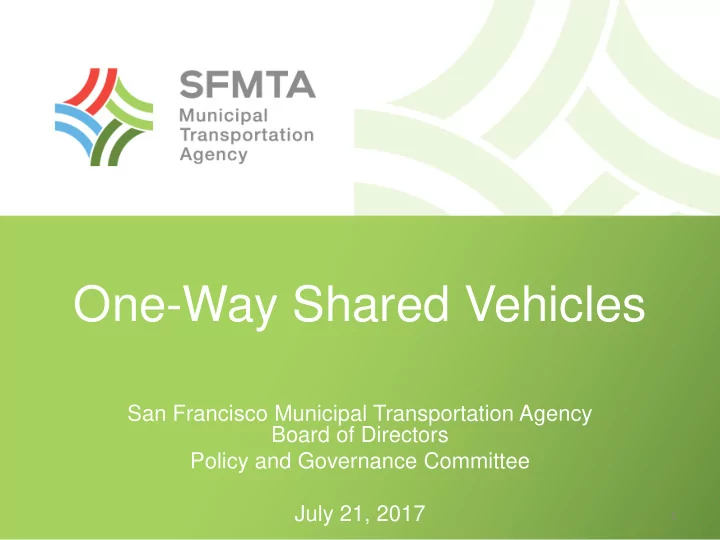

One-Way Shared Vehicles San Francisco Municipal Transportation Agency Board of Directors Policy and Governance Committee July 21, 2017 1
Two Types of Vehicle Sharing One-way (free-floating) Round-trip Vehicle parked in any legal Vehicle returned to the parking spot within “home same designated on-street zone” or off-street space Oakland’s Gig one-way vehicle share program Existing on-street vehicle share pilot 2 2
One-Way Vehicle Sharing in North America 3
City Policies Emerging Transportation Services SFMTA Strategic Guiding Principles (draft) Plan: FY 2013-FY2018 • Make transit, walking, • Safety bicycling, taxi, ridesharing & carsharing the preferred • Transit means of travel . • Equity • Disabled Access • Clean Air/Sustainability Transit-First Policy • Congestion • The City and County shall encourage innovative • Data Transparency solutions to meet public • Labor and Consumers transportation needs. • Financial Impact Vision Zero Policy • Reduce severe and fatal injury inequities across neighborhoods, transportation modes, and populations. 4
Potential Benefits and Concerns Potential Benefits Potential Concerns • Added mobility • Potentially adding vehicles to streets • First/last mile solution • Fewer vehicles on the road • Competition with transit and • Members sell cars other modes • Members don’t buy cars • Community sensitivity • Economical • Clustering • Low cost per ride • Dwell time • Pay-as-you-go • RPP and meter exemptions 5
Academic Research • Martin & Shaheen (2016): Analysis of one-way vehicle share in: • Calgary • San Diego • Seattle • Vancouver • Washington, D.C. • Found that one-way car sharing led to: • Decrease in vehicle ownership • Decrease in vehicle miles traveled (with some questions about the conclusions) • Fewer GHG emissions 6
Academic Research Mode Change Attributed to car2go in Washington, DC and Seattle Urban Rail 5% 9% 86% Bus 7% 26% 67% Drive Overall 32% 14% 54% Walk 17% 10% 73% Bicycle 5% 93% Taxi 46% 52% TNCs 7% 30% 64% Increased Decreased No Change Frequency Frequency 7
Case Study: Gig in Oakland • Fleet of 250 cars; service started April 30 • “Free-Floating Zone Parking” Permit (FFZP) • “Master Residential Parking” Permit (MRPP) • Spatial equity and curb access • Clustering 8
Points to Consider • Possibility to reduce number of vehicles • Increased transportation options or adding unnecessary capacity? • Potential test of cordon/congestion pricing • Potential geo-fencing to address clustering • Neighborhood equity 9
Thank You Parking Policy Team Sustainable Streets Division | Parking San Francisco Municipal Transportation Agency 10
Recommend
More recommend